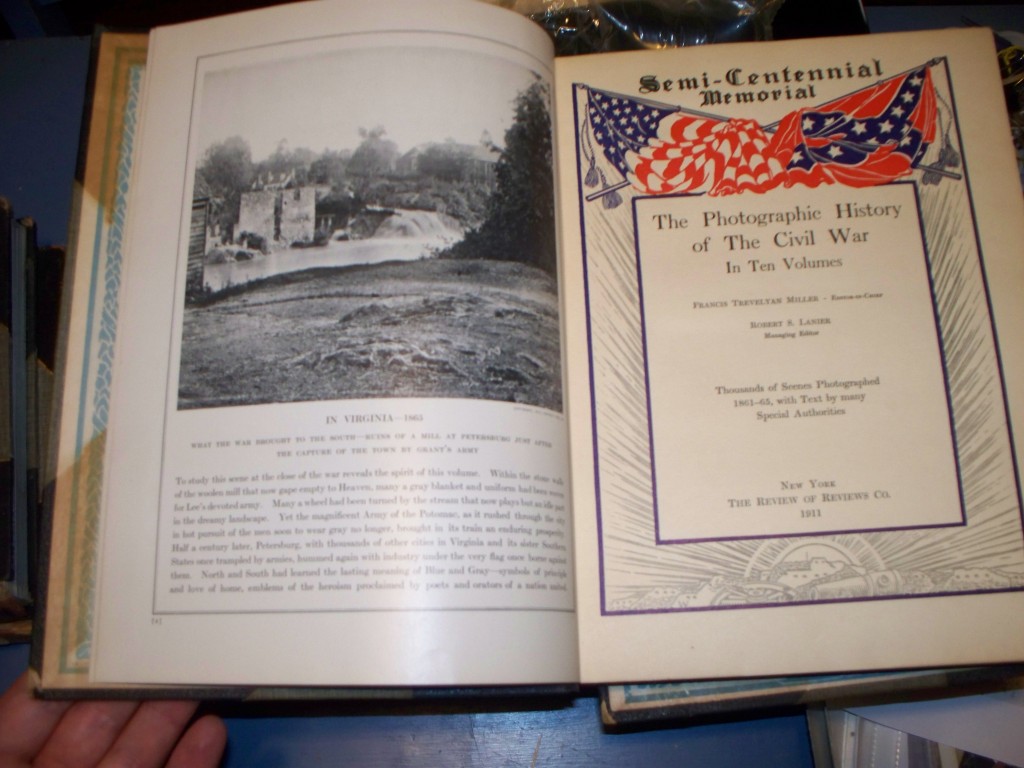Photographic History Donation to Gratz Historical Society
Posted By Norman Gasbarro on June 16, 2011
A recently received donation to the Schwalm Research Library of the Gratz Historical Society of the complete ten-volume first edition of The Photographic History of the Civil War generated heightened excitement and interest in the Civil War Research Project during one of the regular Wednesday research sessions. The books arrived in Gratz on 2 June and were the gift of Julia Bayly, a Freelance Writer-Photographer of Fort Kent, Maine.
Ms. Bayly contacted the Gratz Historical Society after reading the series of posts on this blog which described the ten-volume set which was issued for the 50th Anniversary of the start of the war. The first post in that series described the set. The next ten posts focused on each volume: (1) The Opening Battles. (2) Two Years of Grim War. (3) The Decisive Battles. (4) The Cavalry. (5) Forts and Artillery. (6) The Navies. (7) Prisons and Hospitals. (8) Soldier Life and the Secret Service. (9) Poetry and Eloquence of Blue and Gray. (10) Armies and Leaders. The final post gave index references to Pennsylvania regiments that were represented in the ten volumes.
Excerpts of the correspondence with Julia Bayly follow:
Well, through the wonder that is the internet I have come across the site for the Gratz Historical Society and Museum. At the time I was researching Francis Miller’s Photographic History of the Civil War, because I have a complete first edition set. Truly a remarkable work….
I stumbled across your site and the mention of the museum having five of the 10 volumes. That really got me to thinking that this work is way too important to languish in my personal collection…. Rather, such books should be with people who really appreciate them and will use them for research and make them accessible to the public….
I would be willing to donate the volumes so long as they are always made accessible to the public for enjoyment and learning….
I am very glad to be giving them to a place where they can be used and enjoyed. Books should never be stashed away and kept from people. I remember when I went to Winnipeg to do research at the Manitoba archives I was allowed to read the actual journals and log books going back to the 1800s – not copies, but the real books, one which had been kept by my great-great uncle. It was an amazing experience and the closest thing to time travel we have.
Ms. Bayly provided also some information about herself and her work:
I have been a print journalist for close to 25 years covering everything from politics to crime to agriculture to sports to features in Maine. I also do a fair amount of travel writing (perhaps someday I can visit Gratz and do a story on it!) I am a lifelong lover of the written word and firmly believe there is no such thing as having too many books. However, I also believe books are meant to be read and a collection like the 10-volume Civil War set deserves to be housed where it will be read by those who will appreciate it. This is what prompted me to consider donating them.
I chose the Gratz Historical Society after conducting an online search. I was drawn to it by the website and the reference to the incomplete set you already have. I honestly have no idea where the books originally came from, as they were among several boxes of items from my childhood home in Portland, Oregon. At the very least, they are well traveled!
When not writing I am an active musher of sled dogs in the winter and bicyclist in the summer. Perhaps some day I will figure out a way to combine the two. I live in Fort Kent with 11 sled dogs, two cats, a flock of laying hens and whatever wild critters happen to be wandering by.
After being notified that the books arrived in good condition and were being processed to be added to the collection, Ms. Bayly reported an amazing coincidence:
Here’s something funny – I am raising meat chickens this summer and they came shipped from a hatchery in Gratz! Funny how these connections happen in life.
One of the truly remarkable things that has been learned from this Civil War Research Project is that a small community in the heartland of Pennsylvania can have such a widespread influence regionally and nationally. The internet has now made it possible to tell stories quickly and efficiently and continue to make new connections in the present and future.
 ;
;




Comments